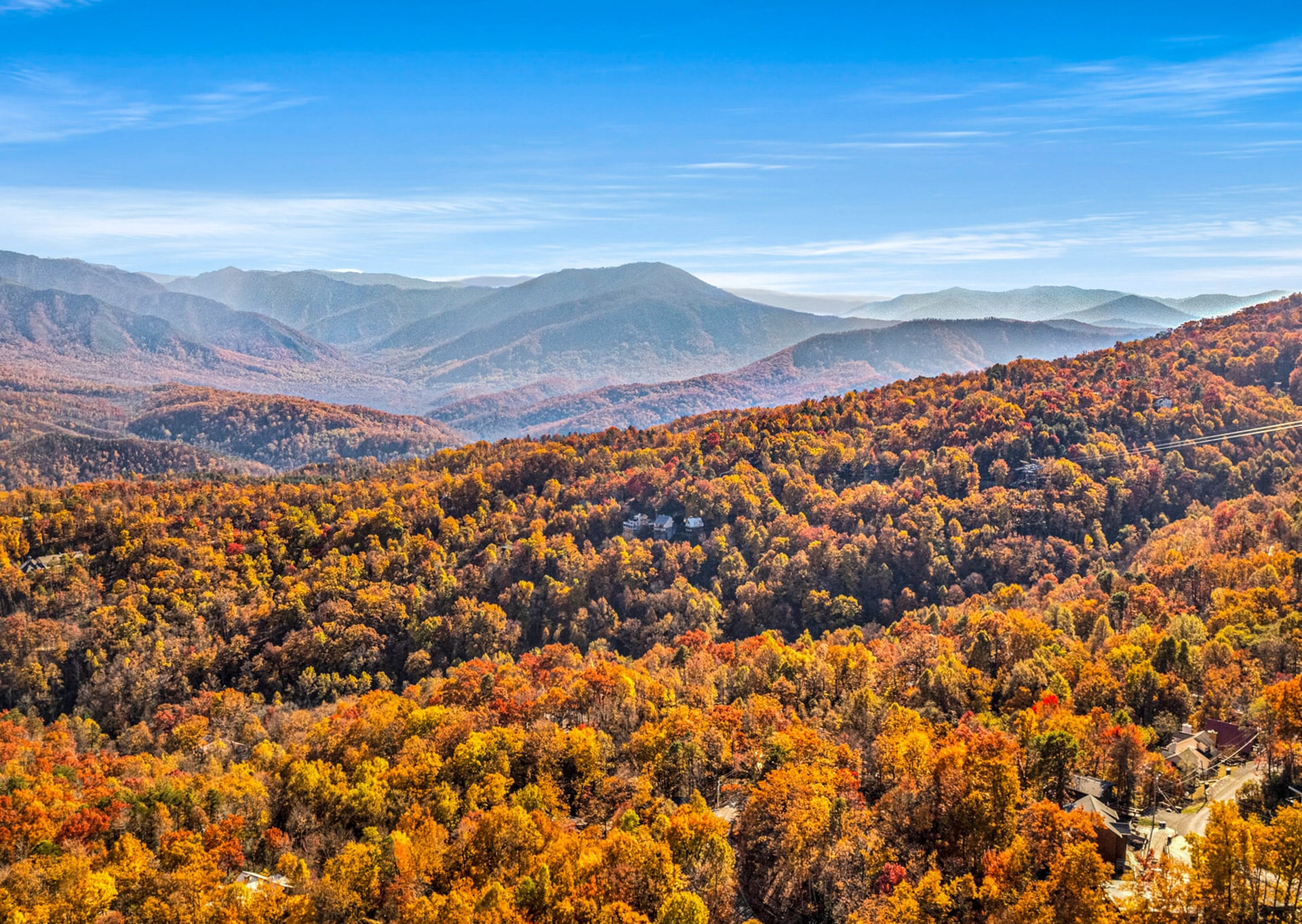Nestled near Great Smoky Mountains National Park, Gatlinburg and Pigeon Forge, Tennessee, are charming towns known for stunning landscapes, vibrant tourist attractions, and, of course, their proximity to one of the most intriguing residents of the Smokies: the black bear. These magnificent creatures have become a symbol of the region, captivating the hearts of both locals and visitors. Let’s explore the fascinating world of black bears in the Smokies and learn more about these iconic animals.
- Excellent Climbers: Black bears are adept climbers and often ascend trees to escape danger or search for food.
- Great Swimmers: They are also strong swimmers and can cover long distances in water.
- Communication: Bears communicate through a range of vocalizations, including grunts, huffs, and growls, as well as through body language and scent marking.
- Scratch and Sniff: Black bears have an exceptional sense of smell, estimated to be seven times better than a bloodhound’s. This allows them to detect food from miles away.
- Bear-y Smart: Black bears are highly intelligent and curious animals. They have been known to solve complex problems to access food and can remember locations where they have found food in the past.
- Moving On Up: Black bears in the Smokies tend to move to higher elevations in the summer to escape the heat and find food. In the fall, they descend to lower elevations where acorns and other nuts are more abundant.
- A Healthy Environment: Black bears are considered an indicator species, meaning their health reflects the overall health of their ecosystem. A thriving bear population suggests a healthy and balanced environment.
The Great Smoky Mountains are home to one of the largest populations of black bears in the eastern United States. It is estimated that around 1,500 bears inhabit Great Smoky Mountains National Park, giving it a high density of bears—approximately two bears per square mile. This makes sightings relatively common, especially during the warmer months when bears are more active.
Black bears are frequently spotted in and around Gatlinburg and Pigeon Forge. With the towns' close proximity to the Great Smoky Mountains National Park, it’s not uncommon to see bears wandering through neighborhoods, exploring the town, or even making a surprise appearance near tourist attractions. Their presence adds a touch of wild beauty to the area, reminding everyone of the rich natural heritage that surrounds them.
Black bears (Ursus americanus) are the smallest and most common bear species in North America. In the Smokies, adult males typically weigh between 250 and 600 pounds, while females weigh between 100 and 300 pounds. Despite their name, black bears can also have cinnamon, brown, or even blonde fur. Their coats are generally glossy, and they have short, rounded ears and a straight facial profile. Their bear paws are especially adorable, but beware—each digit has a long, curved claw, making them excellent climbers!
Black bears in the Smoky Mountains have a varied diet, consisting of approximately 85% plant matter and 15% animal matter. They are omnivores and primarily eat berries, nuts, fruits, insects, and vegetation. In the fall, acorns and other nuts become crucial as bears fatten up for winter hibernation. They are also known to consume carrion and occasionally small mammals or fish.
In urban areas like Gatlinburg and Pigeon Forge, bears can be attracted to human food sources. It is crucial for residents and visitors to secure their trash and avoid leaving food outdoors to prevent conflicts and ensure the bears remain wild. It might seem kind to feed the bears, but ultimately it does a massive disservice to these beautiful creatures.
Black bears are most active from late spring through early fall. They are easily spotted around town throughout summer months, providing incredible entertainment and education for visitors to the Smokies. As the weather cools, they prepare for hibernation. During this period, they retreat to dens, which can be located in hollow trees, caves, or even beneath fallen logs. Remarkably, they do not eat, drink, or excrete during hibernation, relying on their fat reserves to survive. Bears can lose up to 30% of their body weight during this time. Despite hibernation tendencies, black bears are still spotted during winter months, but cold-weather sightings are more rare.
Black bears typically mate in June and July, with a delayed implantation ensuring that cubs are born during the hibernation period, usually in January or February. Females give birth to one to four cubs, which are blind, hairless, and weigh around 8 ounces at birth. Cubs stay with their mothers for about 18 months, learning vital survival skills before venturing out on their own. It's not uncommon to see mama bears with several babies scurrying around town and up trees. Sightings like these are a delight for every onlooker!
While black bears are generally not aggressive towards humans, it’s crucial to respect their space and observe safety guidelines. Never approach or feed bears, as this can lead to dangerous situations for both humans and bears. Proper food storage and waste disposal are essential to avoid attracting bears to cabins, campsites, or picnic areas. Here are a few best practices to remember:
- Store Food Securely: Keep food indoors or in locked vehicles.
- LOCKED Vehicles: Black bears have learned how to open car doors, and they can get inside in under a minute. They'll do a deep dive searching for food, and chances are your upholstery will never be the same again. ALWAYS LOCK YOUR CAR!
- Dispose of Trash Properly: Use bear-resistant trash cans and never leave trash outside.
- Keep a Safe Distance: If you see a bear, observe from a distance of at least 150 feet.
- Do Not Feed Bears: Feeding bears can make them reliant on human food and increase the risk of conflicts.
-A2AC039E-83BE-40F7-9B4647F26314A8AC.jpg)
Bear sightings are one of the many reasons people flock to Tennessee's Smoky Mountains, and Mountain Laurel Chalets cabins, with their sprawling porches and decks, provide the perfect spots to sit back and observe all the wildlife and natural beauty our region has to offer. Check out our Gatlinburg and Pigeon Forge vacation rental cabins now, and plan a getaway to the Smokies to enjoy bear sightings, long-range mountain views, and the most peaceful place on earth!


.jpg)






